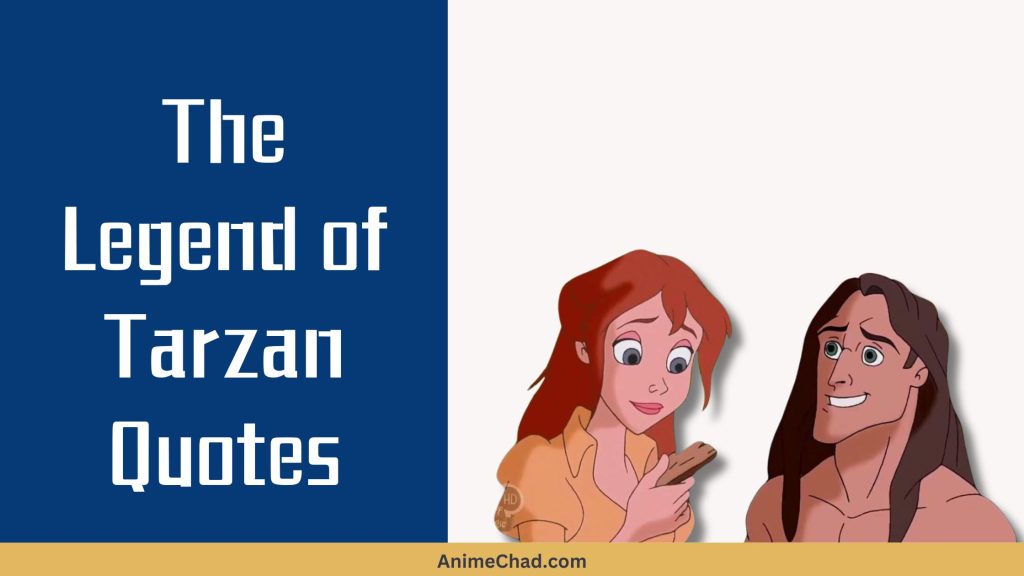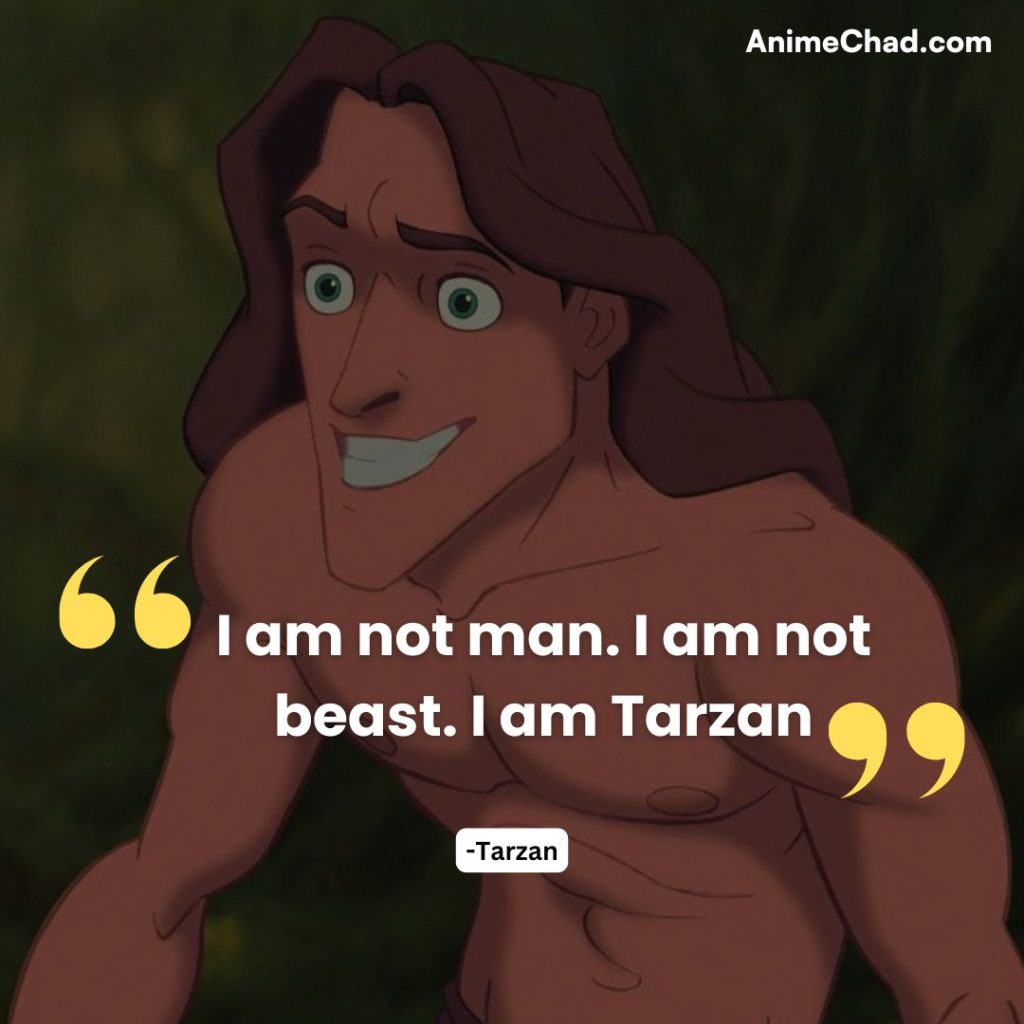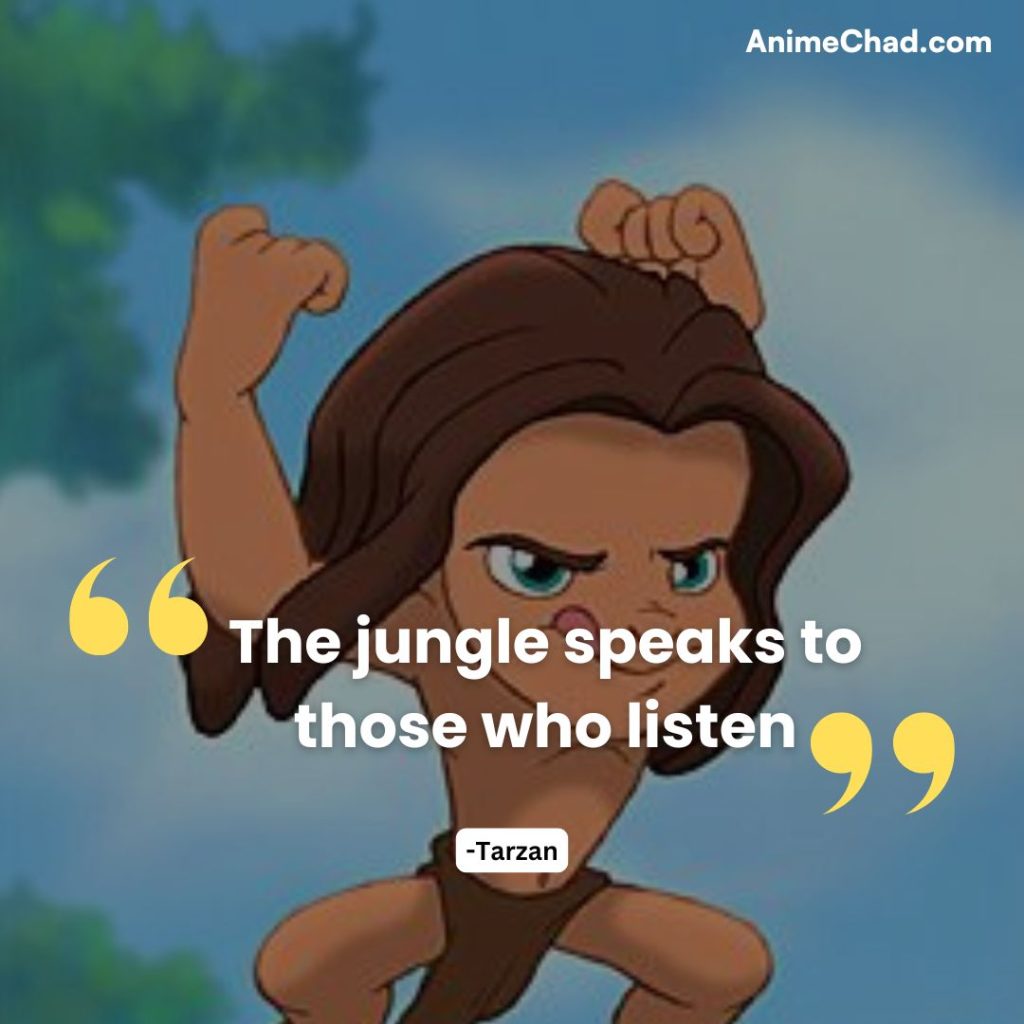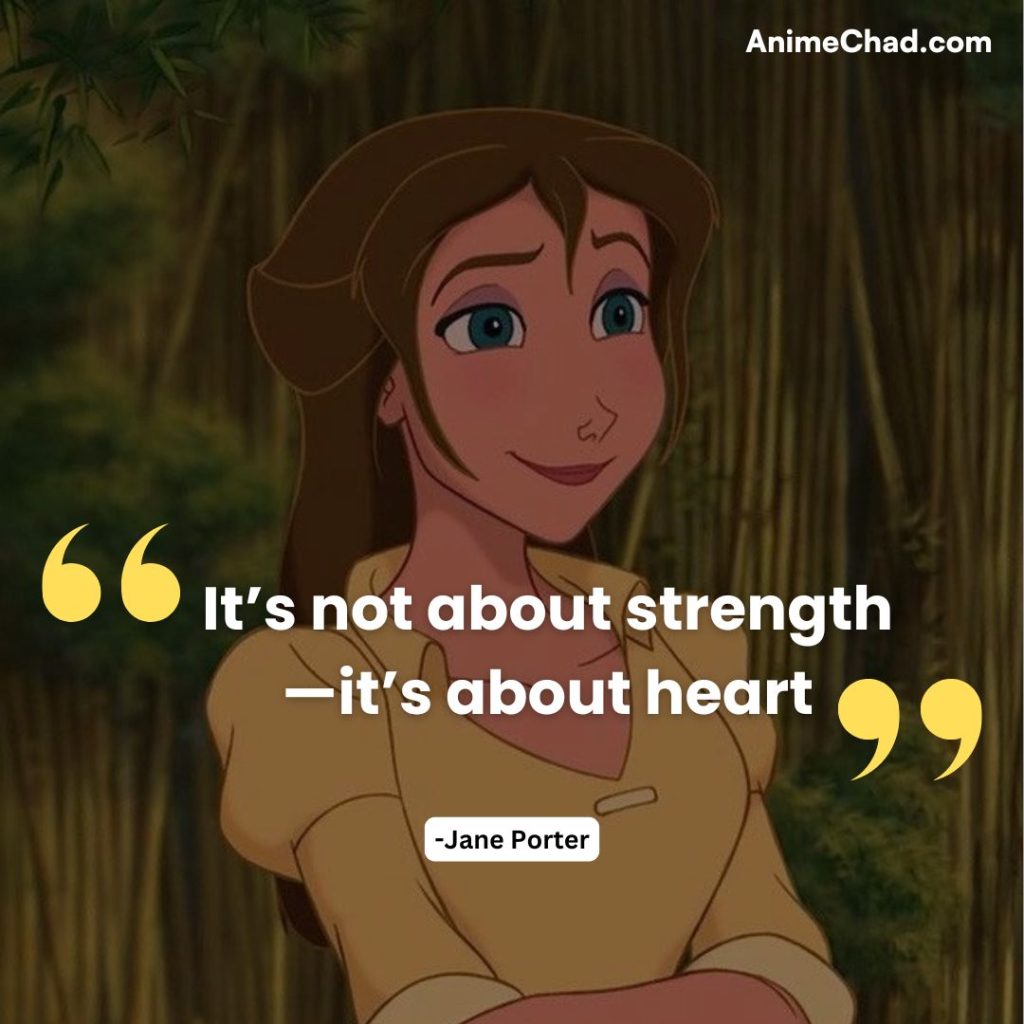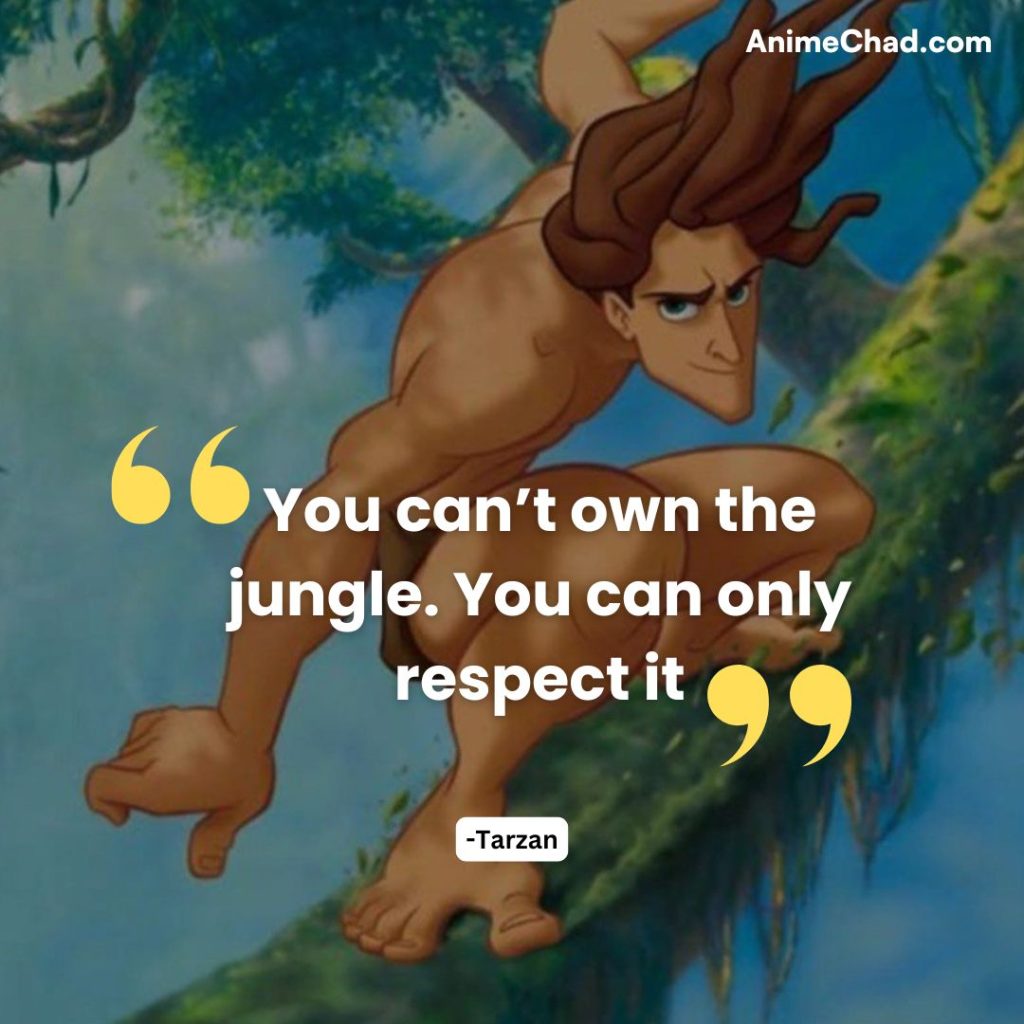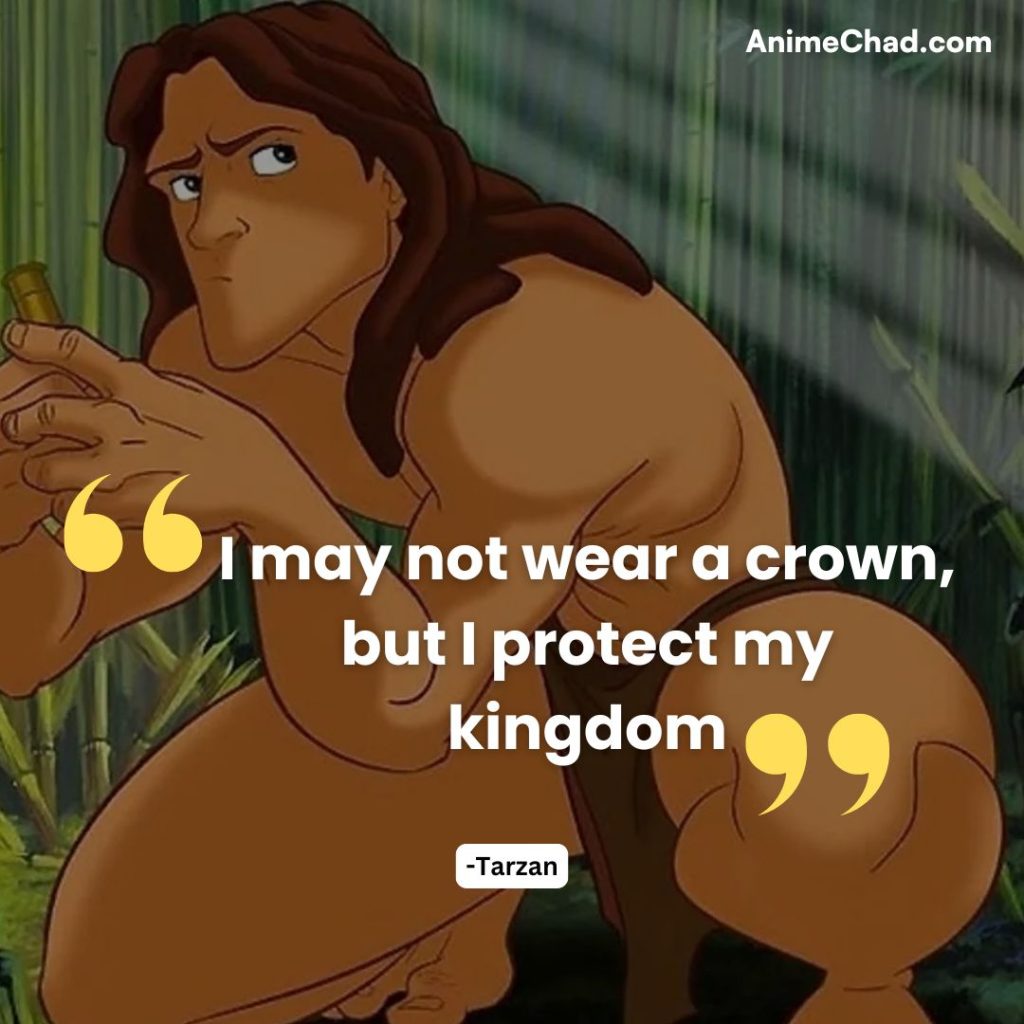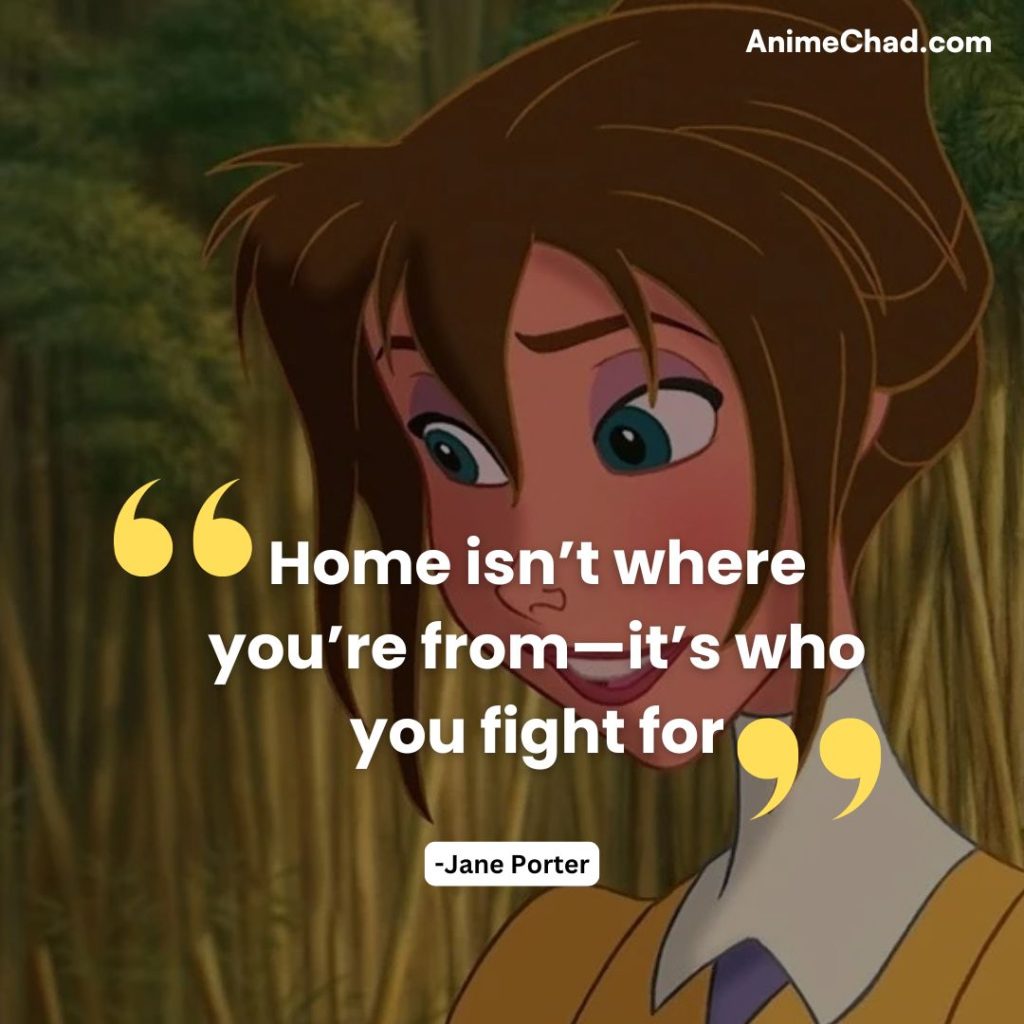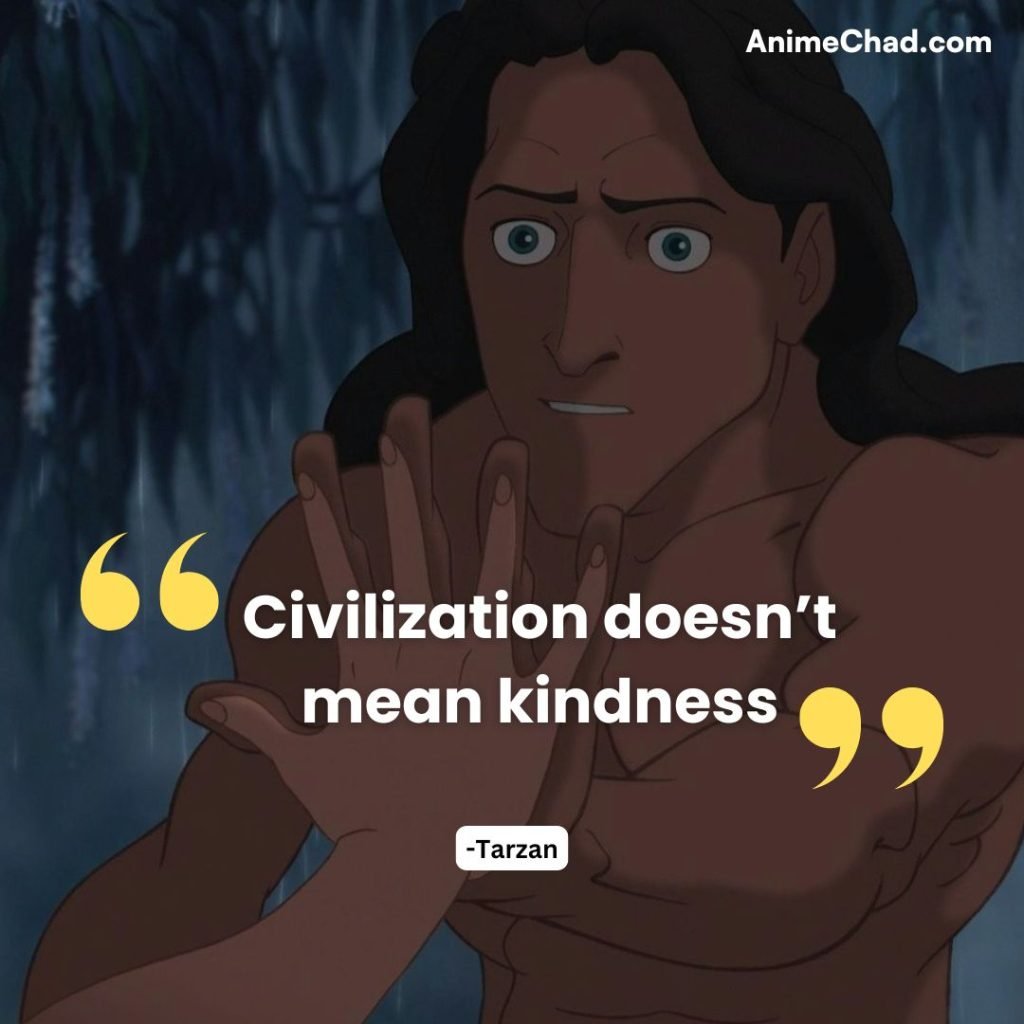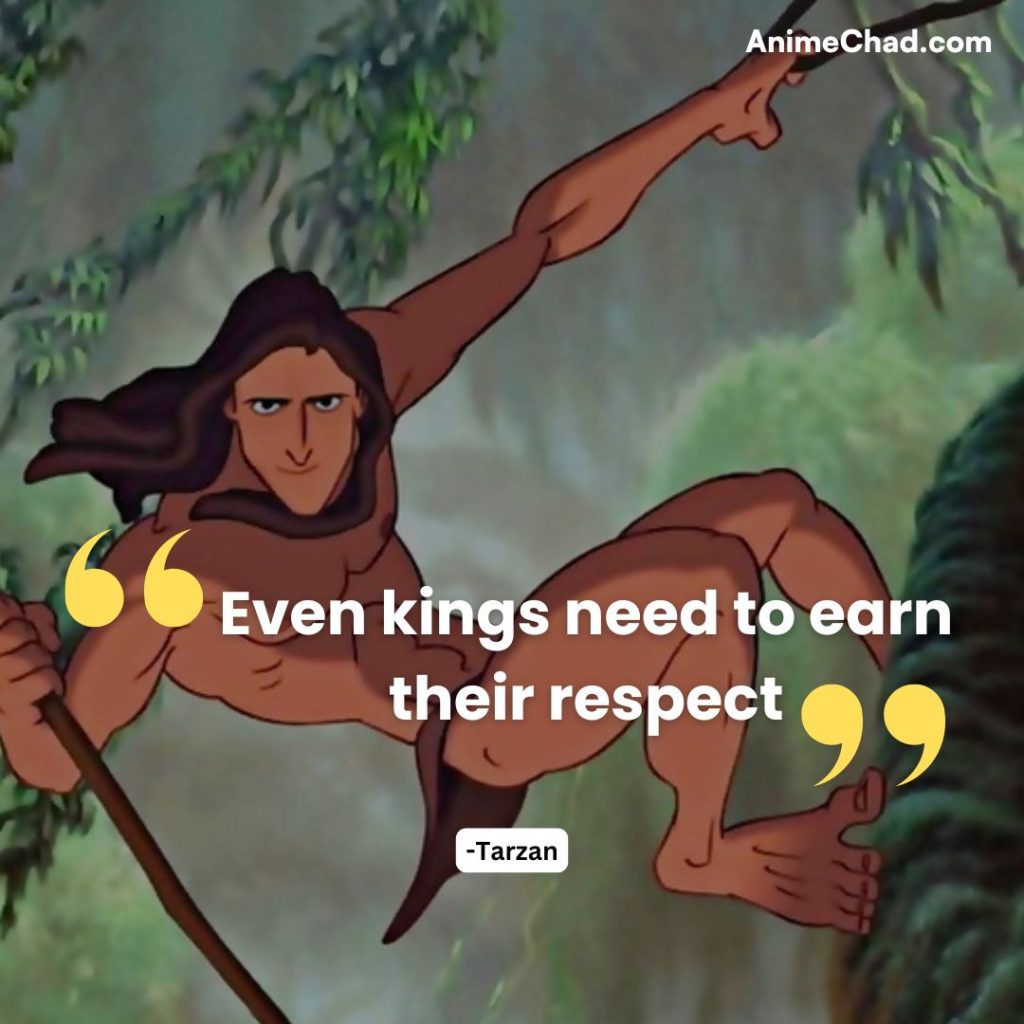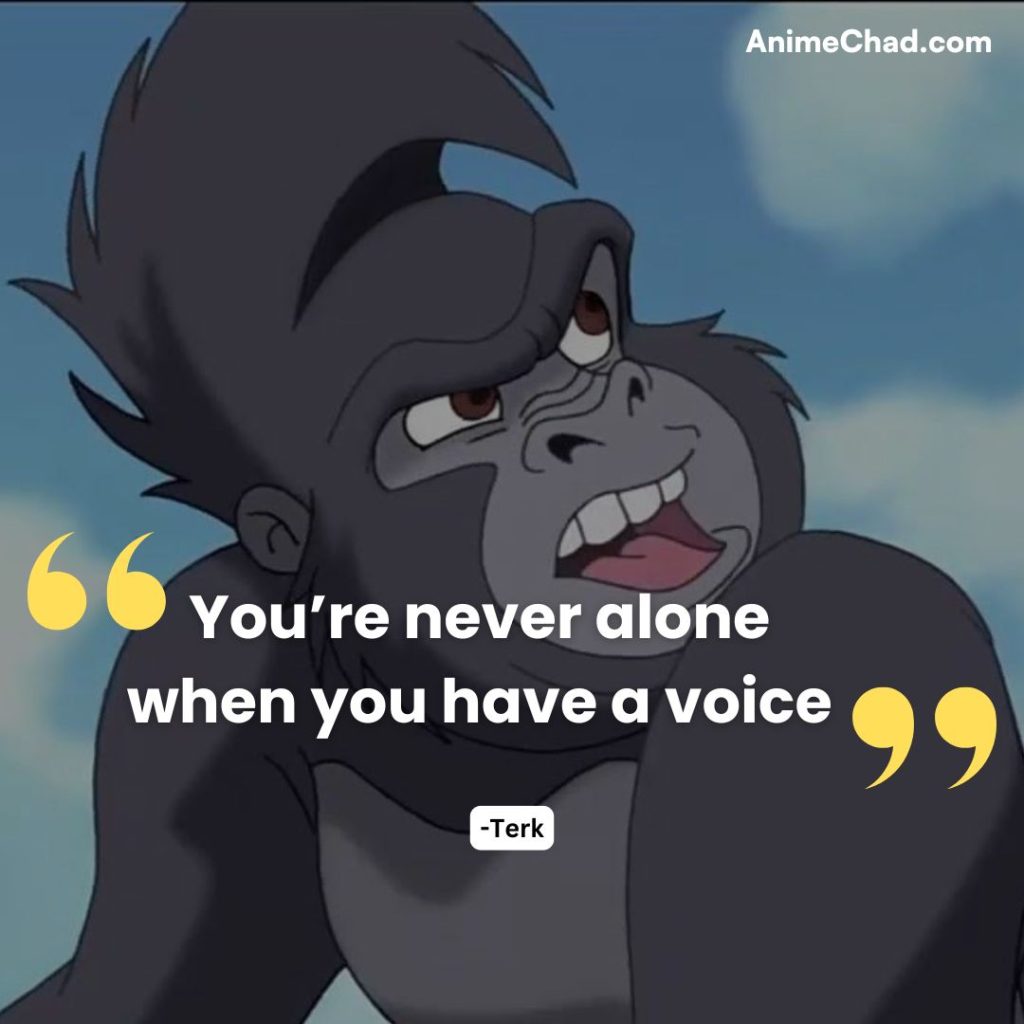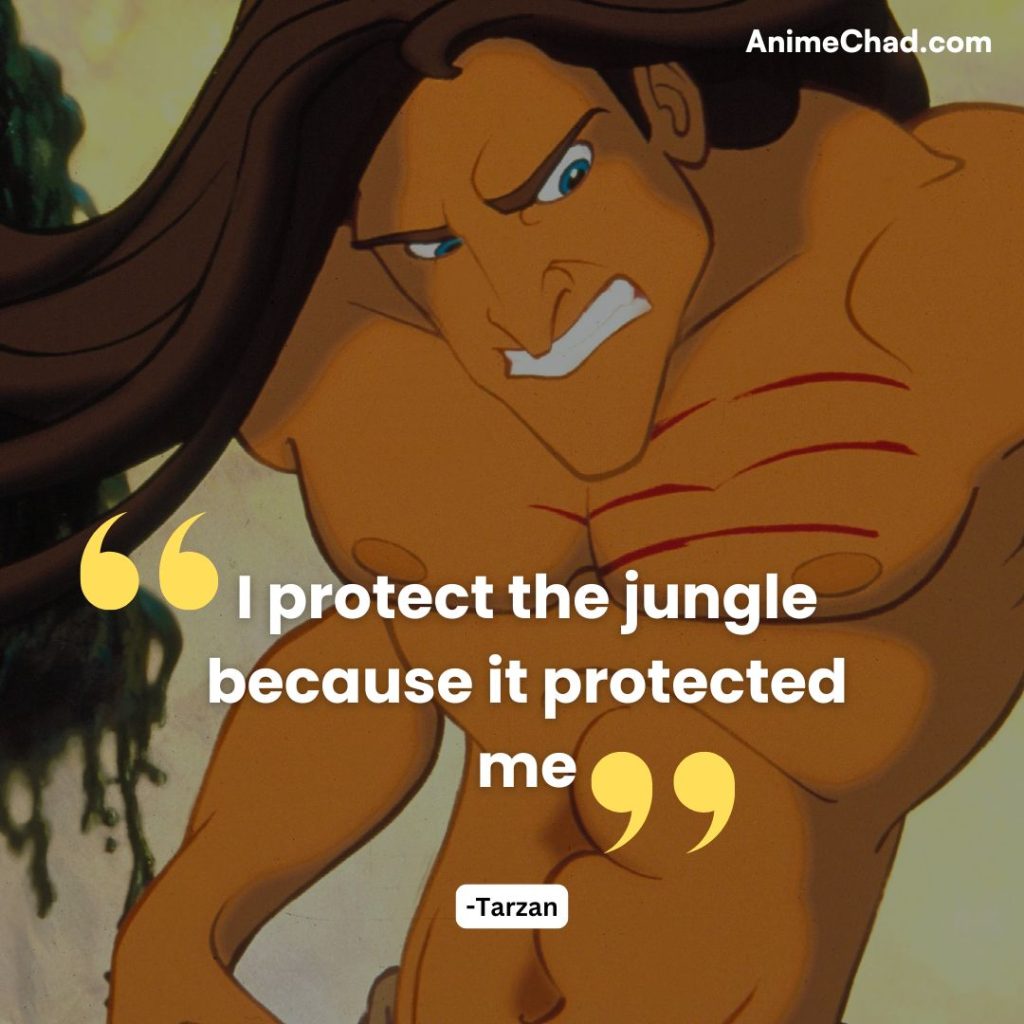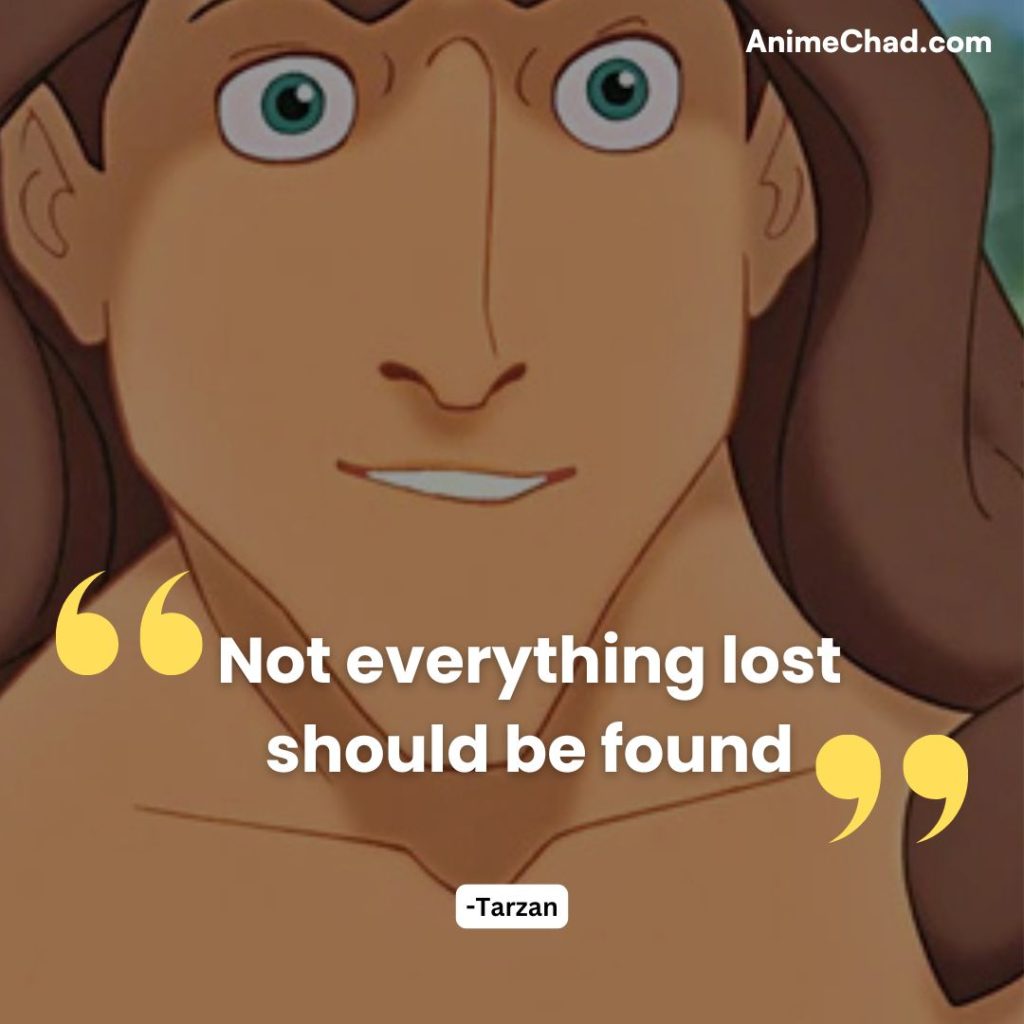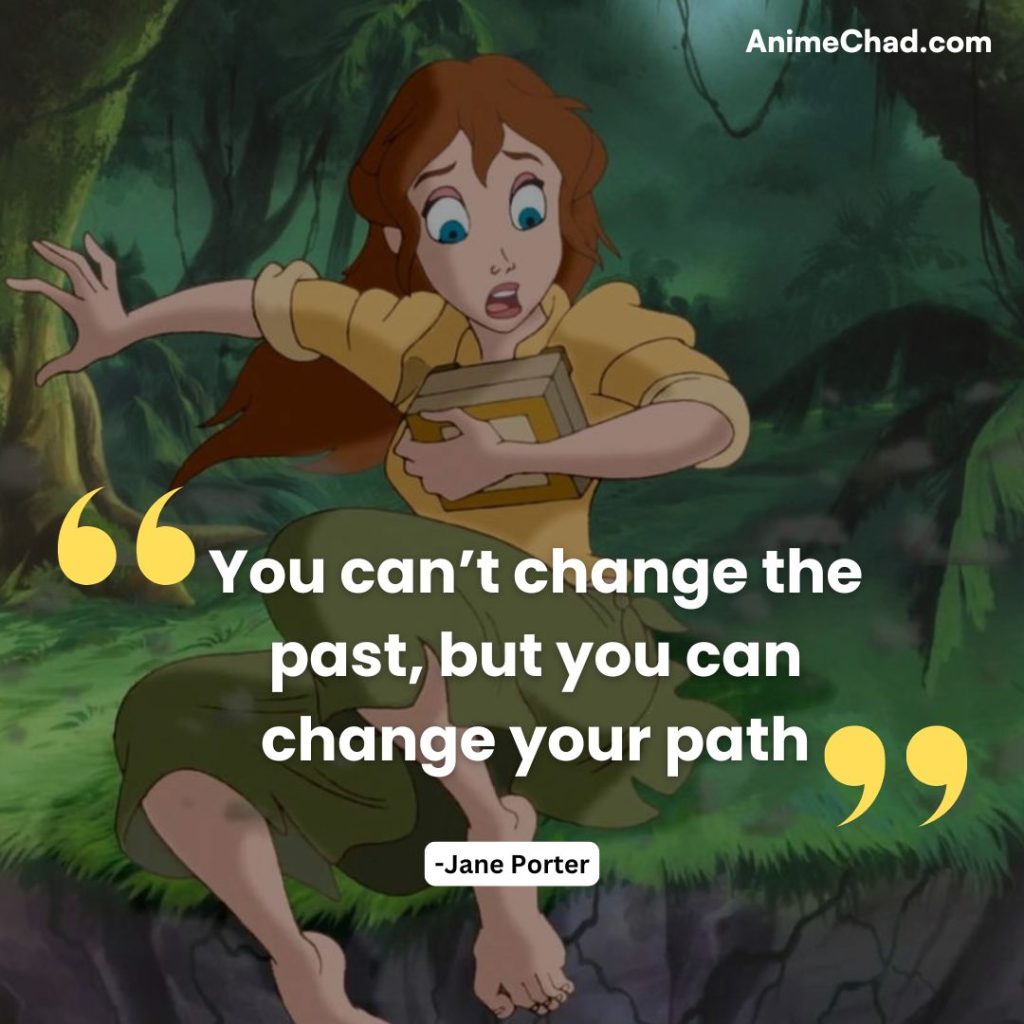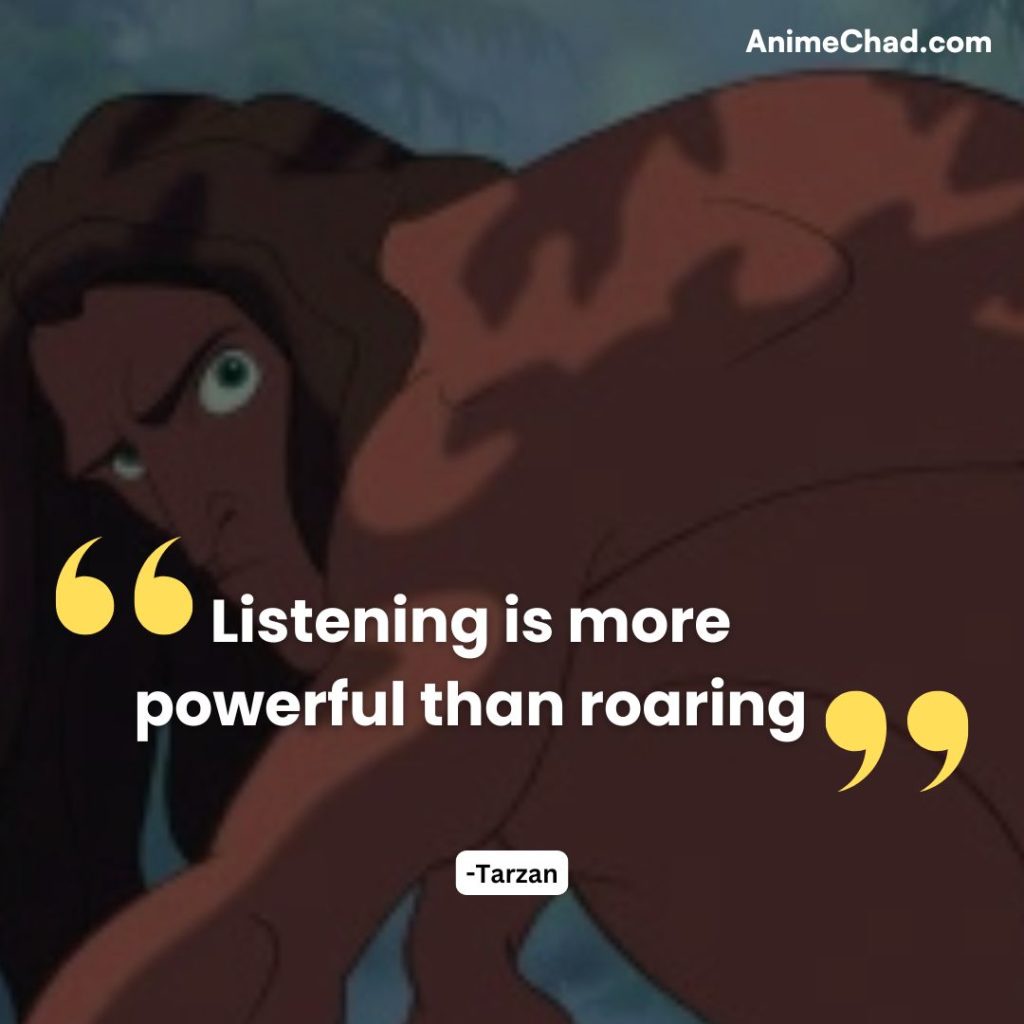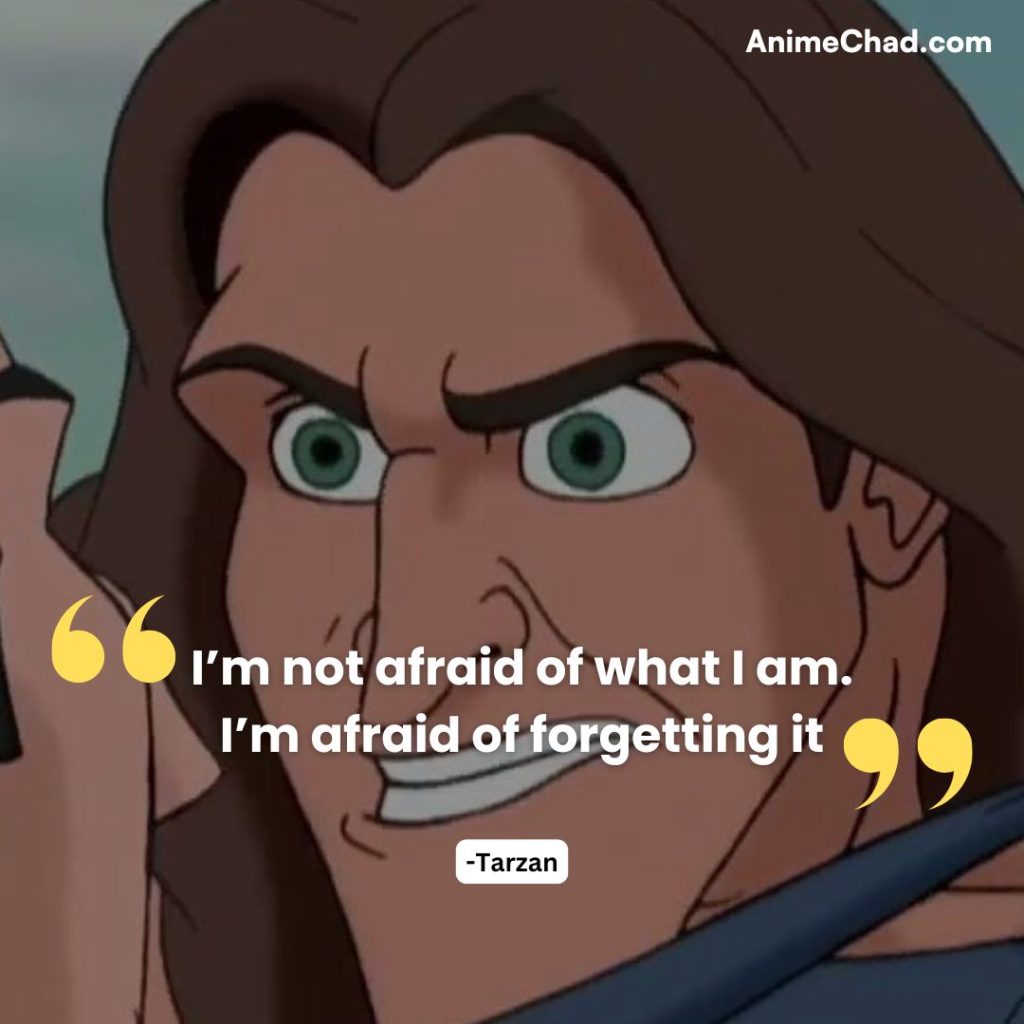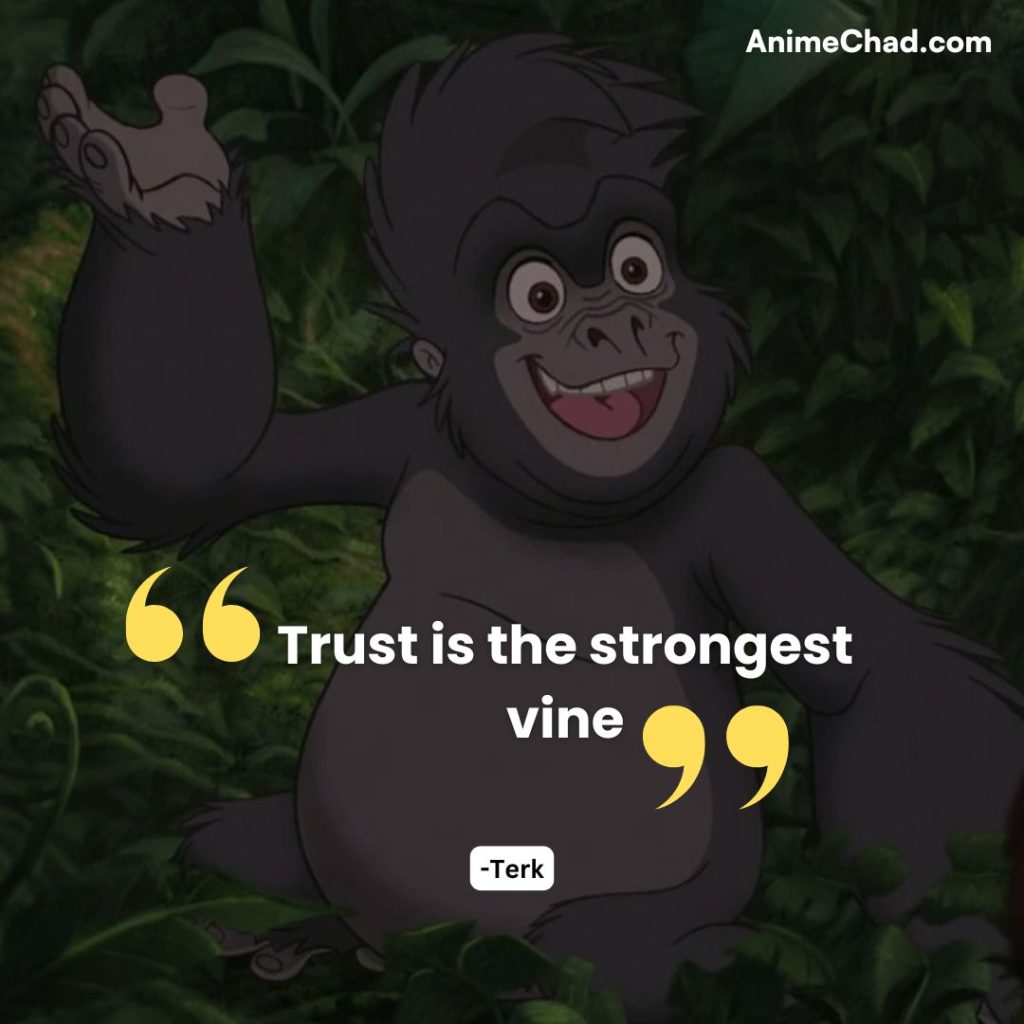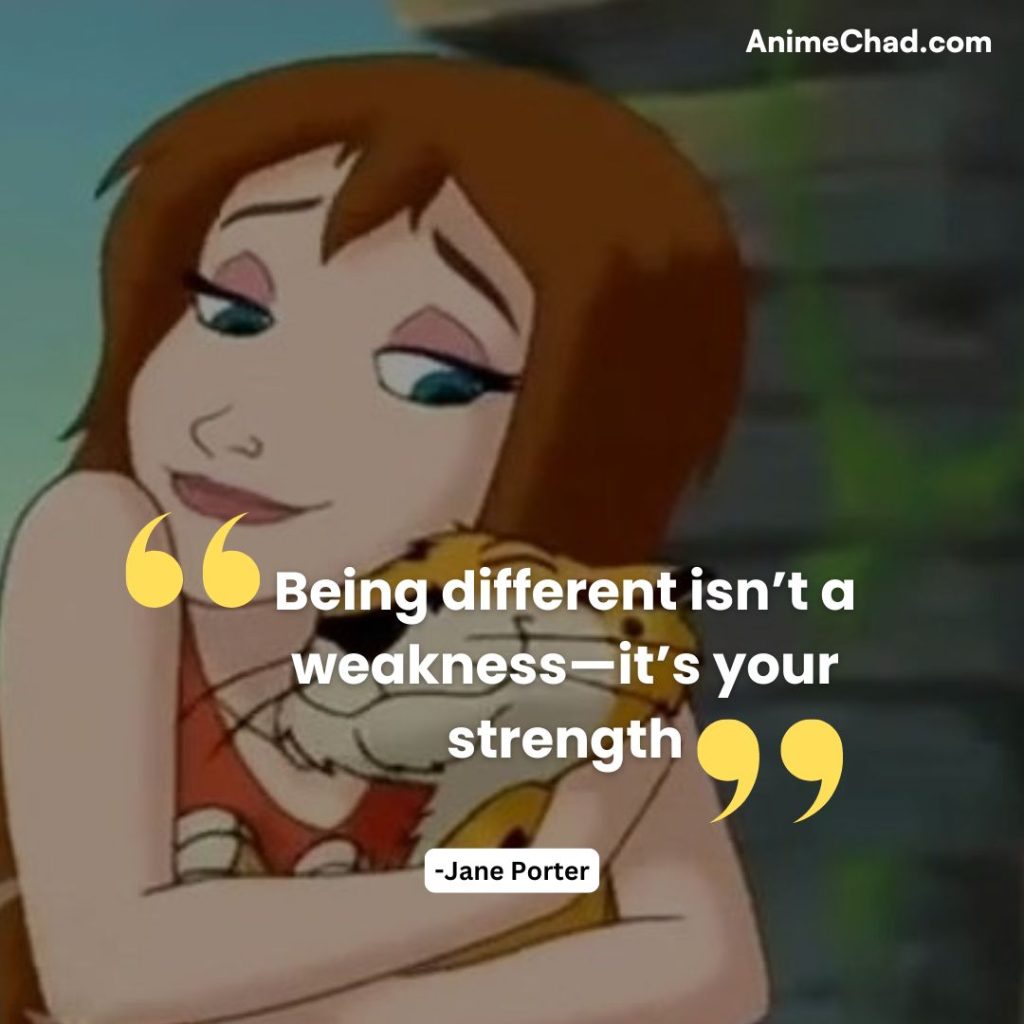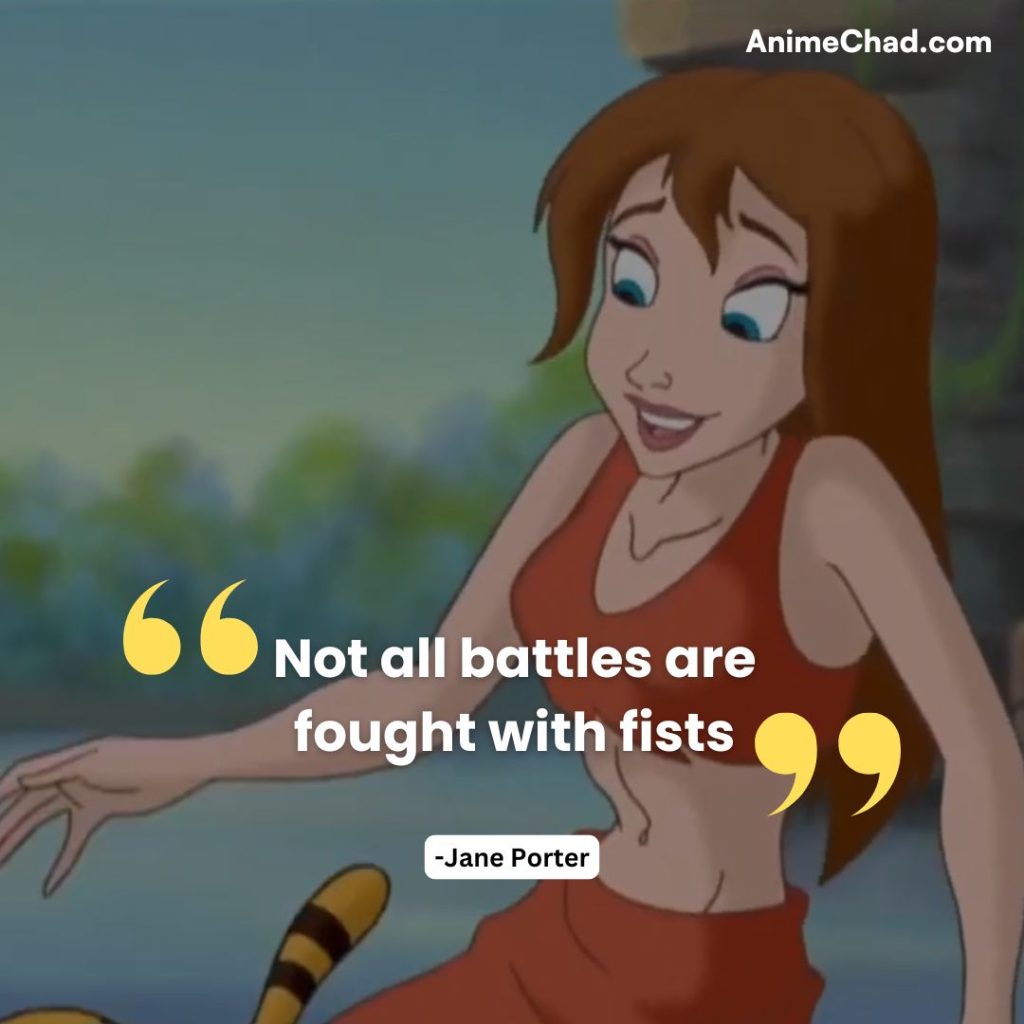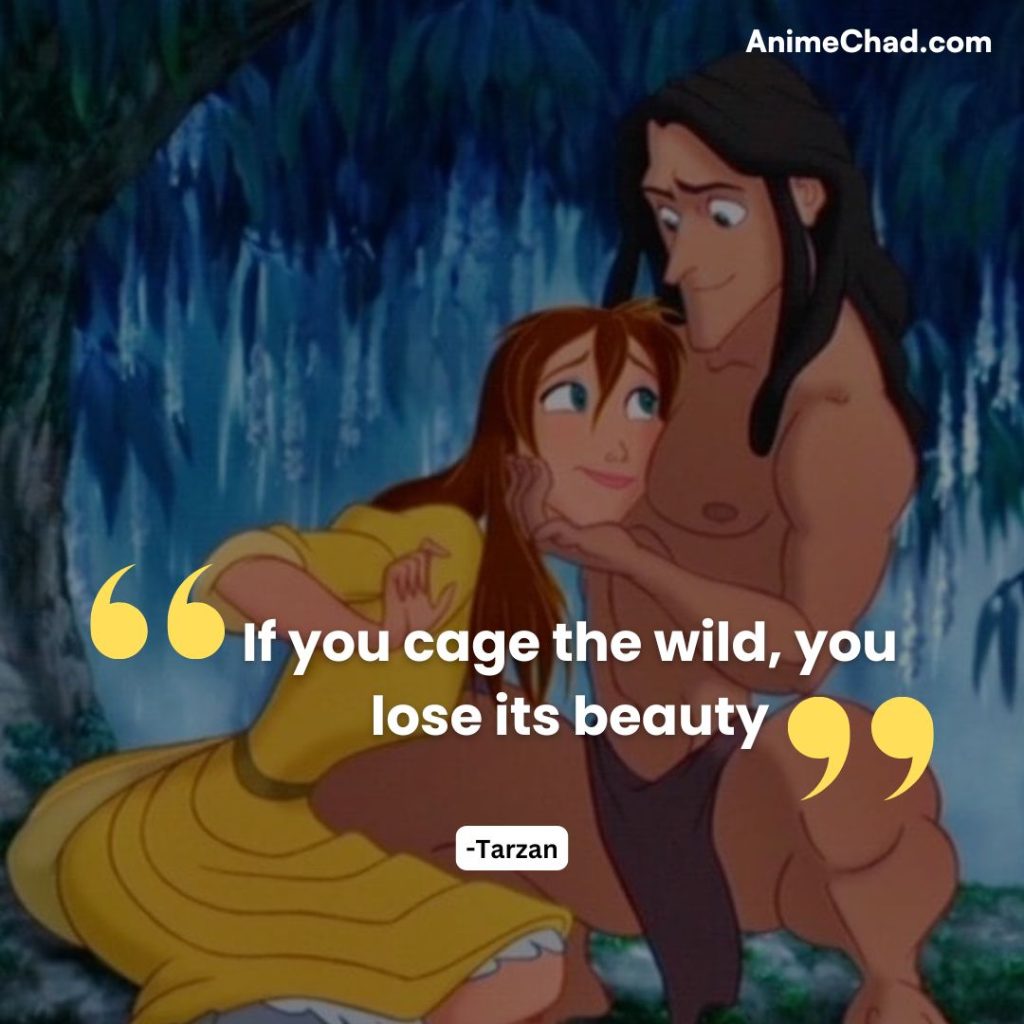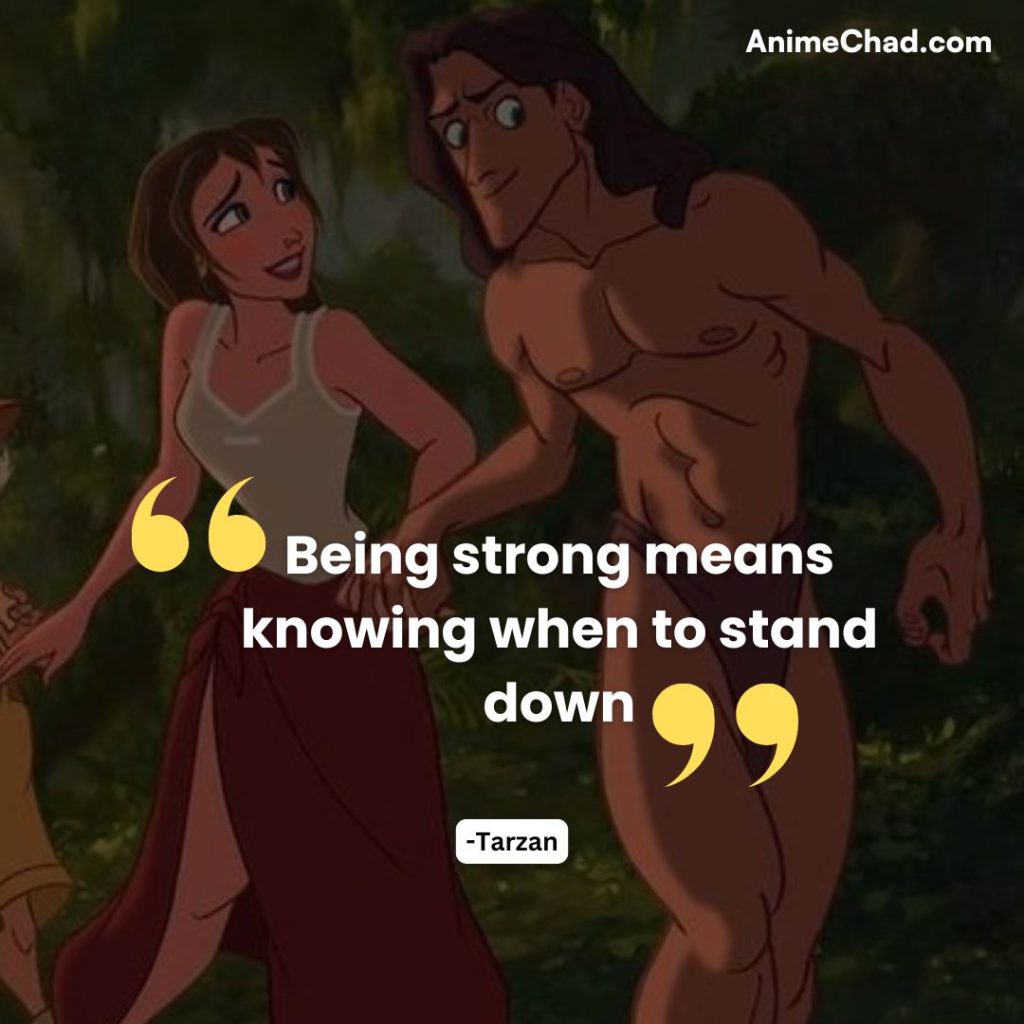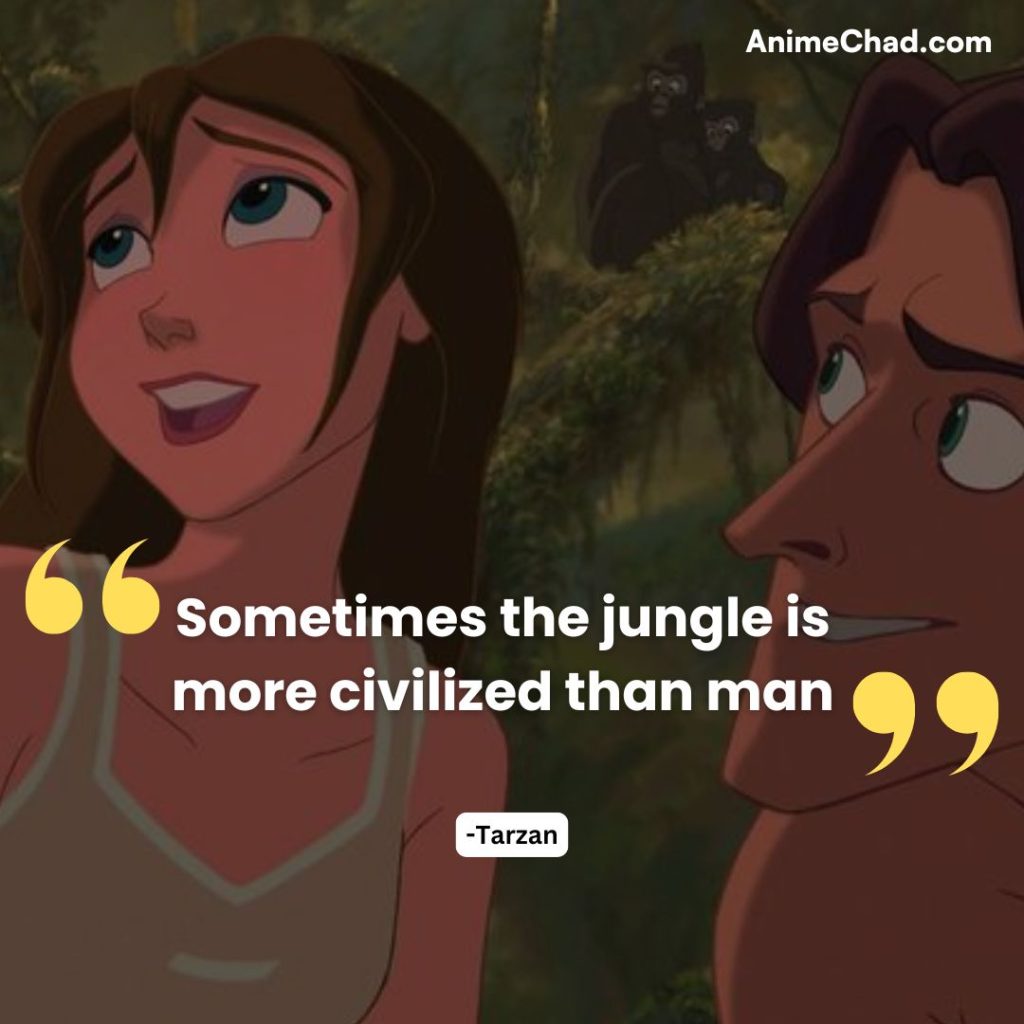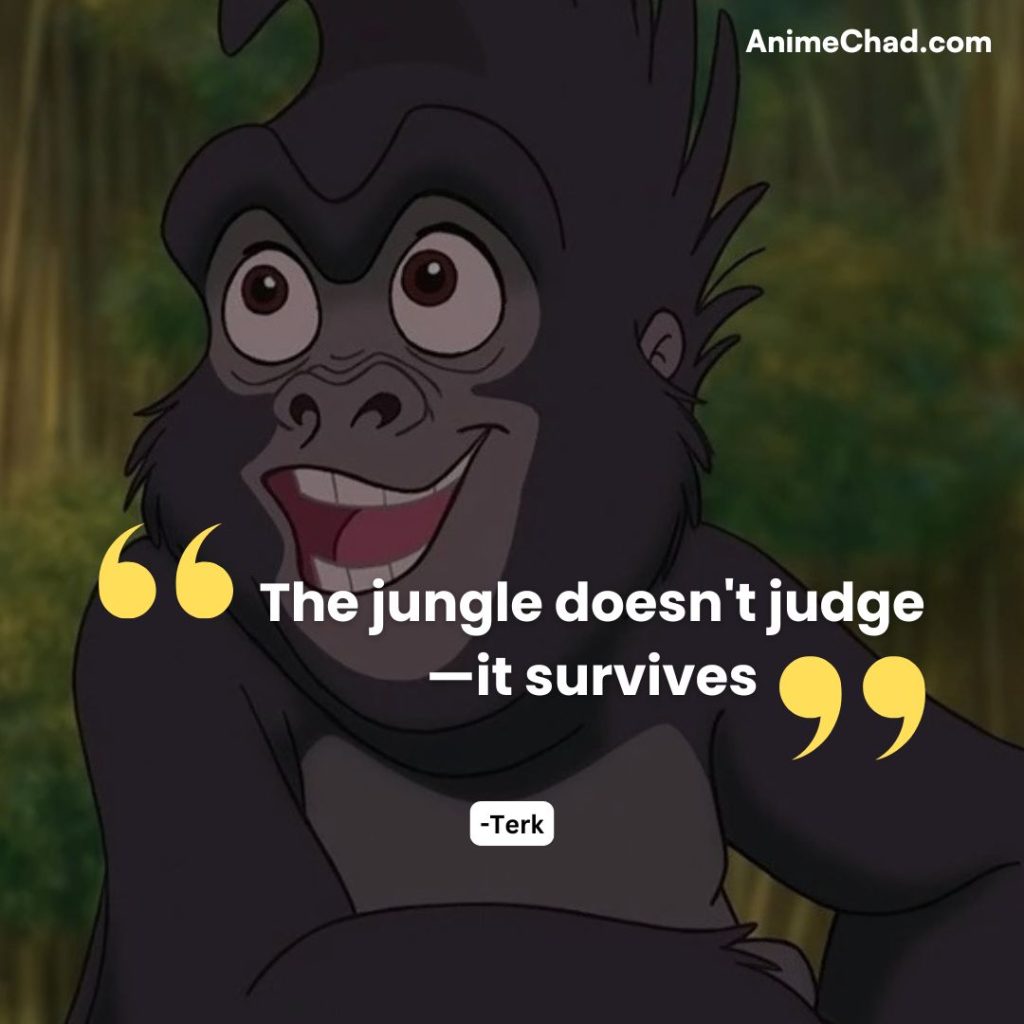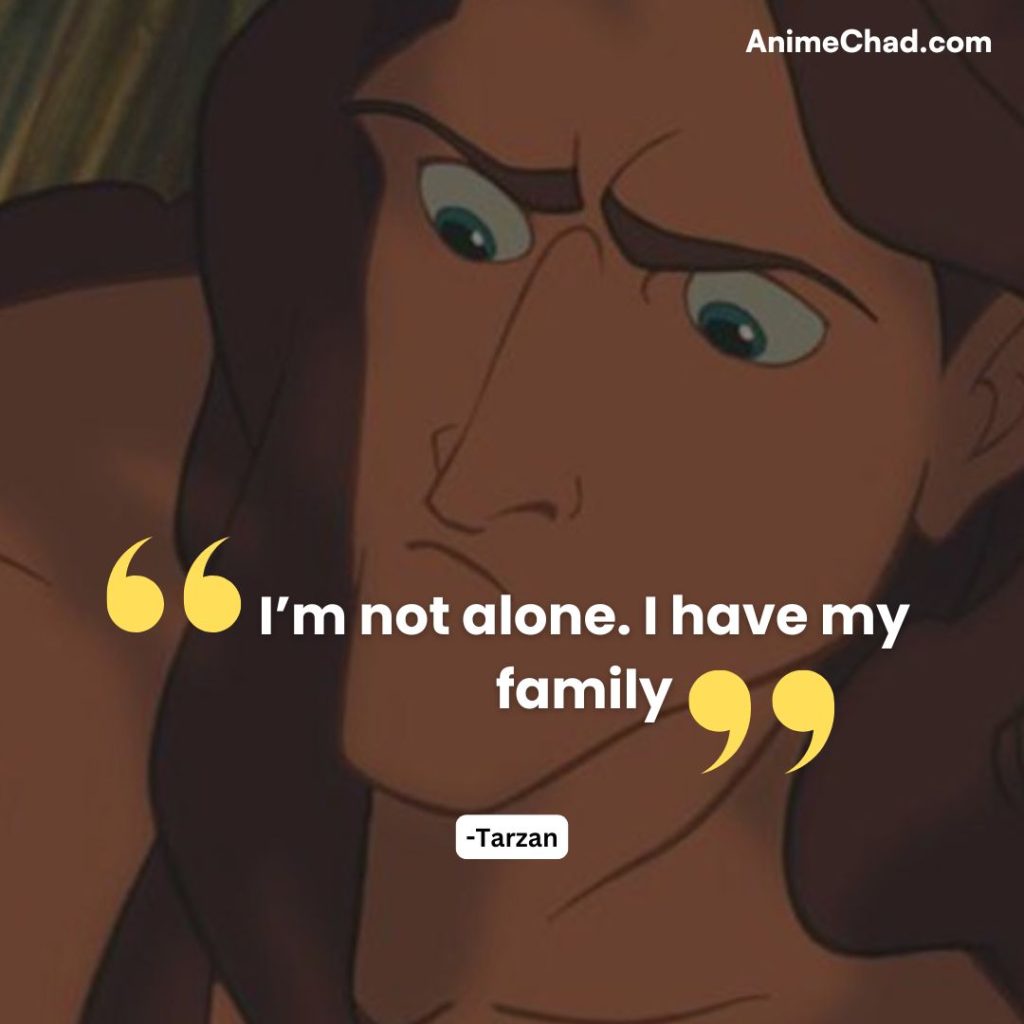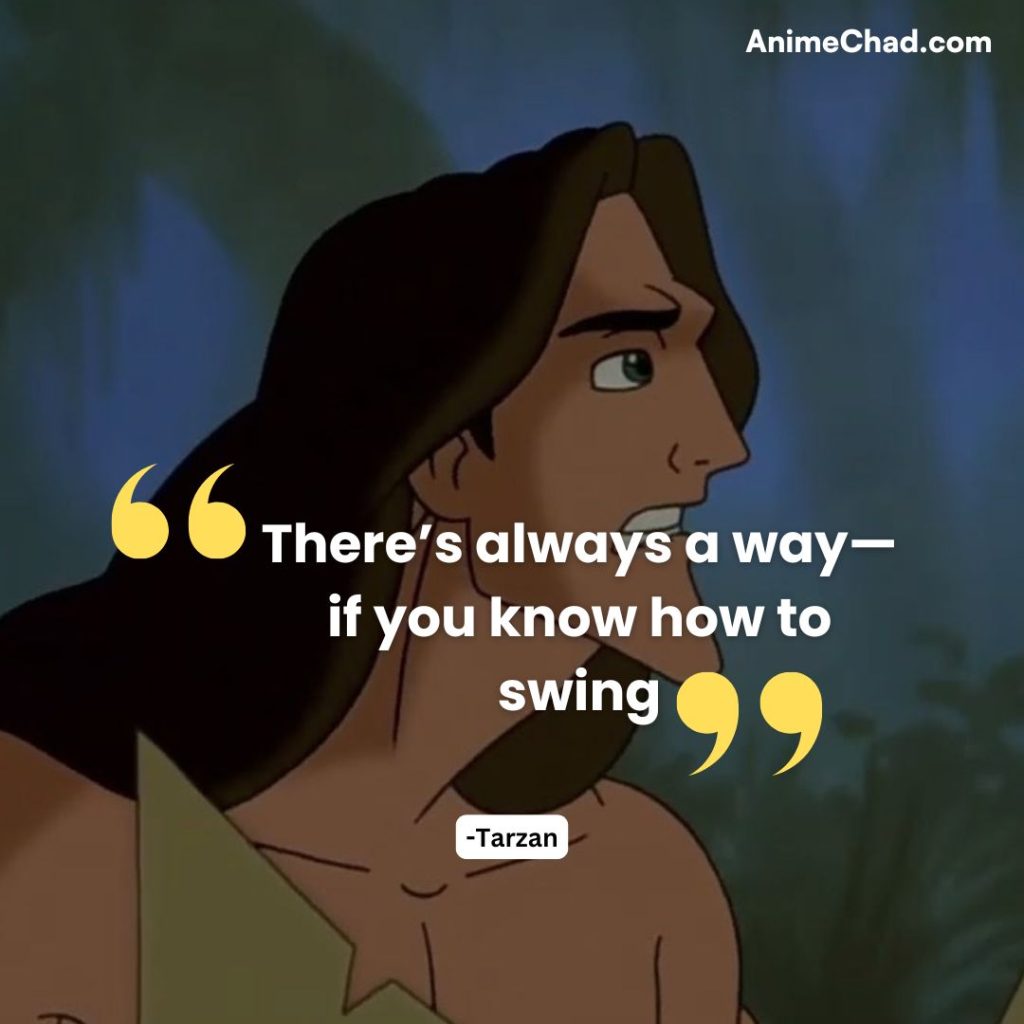The Legend of Tarzan continues the story of the iconic jungle hero as he adjusts to his dual identity—civilized man and wild protector—alongside Jane, Terk, Tantor, and his gorilla family.
The series explores themes of belonging, nature vs. nurture, loyalty, courage, and the struggle between tradition and progress.
This curated quote collection highlights 25 of the most meaningful, character-defining lines from the animated series—capturing emotional growth, moral lessons, and the timeless strength of heart over hierarchy.
I am not man. I am not beast. I am Tarzan
Episode: 1 (Tarzan and the Race Against Time)
Speaker: Tarzan
Context: Tarzan reaffirms his unique identity—neither fully human nor animal—embracing the harmony between both worlds.
The jungle speaks to those who listen
Episode: 6 (Tarzan and the Lost City of Opar)
Speaker: Tarzan
Context: Reflects Tarzan’s deep bond with nature and intuition, contrasting human arrogance with primal wisdom.
It’s not about strength—it’s about heart
Episode: 11 (Tarzan and the Silver Ape)
Speaker: Jane Porter
Context: Jane comforts a young gorilla, emphasizing compassion over dominance, and reinforcing the show’s emotional core.
You can’t own the jungle. You can only respect it
Episode: 5 (Tarzan and the Leopard Men)
Speaker: Tarzan
Context: A powerful reminder to an intruding explorer that nature is not a resource, but a home.
Sometimes, the bravest thing is to admit you’re afraid
Episode: 10 (Tarzan and the Enemy Within)
Speaker: Tantor
Context: Tantor’s fear becomes a strength when he speaks up—an important message about emotional courage.
I may not wear a crown, but I protect my kingdom
Episode: 13 (Tarzan and the Gauntlet of Vengeance)
Speaker: Tarzan
Context: Tarzan reclaims leadership through action, not titles—reinforcing his protective, grounded sense of duty.
Home isn’t where you’re from—it’s who you fight for
Episode: 7 (Tarzan and the Rogue Elephant)
Speaker: Jane Porter
Context: Jane reflects on loyalty and belonging, emphasizing that shared values create true family.
Civilization doesn’t mean kindness
Episode: 9 (Tarzan and the British Invasion)
Speaker: Tarzan
Context: Tarzan calls out hypocrisy when humans exploit the jungle, revealing the show’s critique of colonial arrogance.
Even kings need to earn their respect
Episode: 4 (Tarzan and the Lost Treasure)
Speaker: Tarzan
Context: Tarzan challenges a self-proclaimed ruler, emphasizing that leadership comes from actions, not bloodlines.
There’s more to learning than books
Episode: 8 (Tarzan and the Flying Ace)
Speaker: Jane Porter
Context: Jane honors Tarzan’s lived wisdom, bridging the gap between formal education and intuitive intelligence.
You’re never alone when you have a voice
Episode: 14 (Tarzan and the Beast From Below)
Speaker: Terk
Context: Terk encourages a frightened animal to speak up, showcasing the power of expression and support.
I protect the jungle because it protected me
Episode: 2 (Tarzan and the Fountain)
Speaker: Tarzan
Context: Tarzan explains his loyalty to nature, underlining the mutual respect between him and the wild.
Not everything lost should be found
Episode: 12 (Tarzan and the Forbidden City)
Speaker: Tarzan
Context: A caution against awakening ancient forces—linking discovery with responsibility and restraint.
You can’t change the past, but you can change your path
Episode: 15 (Tarzan and the Eagle’s Feather)
Speaker: Jane Porter
Context: Jane helps Tarzan cope with regret, delivering a hopeful message about redemption and forward movement.
Listening is more powerful than roaring
Episode: 18 (Tarzan and the Seeds of Destruction)
Speaker: Tarzan
Context: Tarzan models restraint during conflict, favoring wisdom over force.
I’m not afraid of what I am. I’m afraid of forgetting it
Episode: 20 (Tarzan and the New Wave)
Speaker: Tarzan
Context: Tarzan fears losing his jungle instincts amid growing exposure to modern life—highlighting identity tension.
Trust is the strongest vine
Episode: 16 (Tarzan and the Hidden World)
Speaker: Terk
Context: Terk uses jungle metaphors to convey the importance of faith in others during uncertain times.
Being different isn’t a weakness—it’s your strength
Episode: 17 (Tarzan and the Mysterious Visitor)
Speaker: Jane Porter
Context: Jane defends an outcast creature, echoing the series’ core message about embracing uniqueness.
Not all battles are fought with fists
Episode: 19 (Tarzan and the Accused)
Speaker: Jane Porter
Context: Jane defends Tarzan in a tribunal, showcasing logic and empathy as tools of justice.
If you cage the wild, you lose its beauty
Episode: 21 (Tarzan and the Savage Storm)
Speaker: Tarzan
Context: Tarzan speaks out against animal captivity, reinforcing his respect for freedom and wildness.
Being strong means knowing when to stand down
Episode: 22 (Tarzan and the Silent Child)
Speaker: Tarzan
Context: Tarzan refrains from attacking, choosing peace to connect with a traumatized child.
Sometimes the jungle is more civilized than man
Episode: 23 (Tarzan and the Flying Hunter)
Speaker: Tarzan
Context: Tarzan draws a contrast between nature’s balance and human chaos, flipping assumptions of superiority.
The jungle doesn’t judge—it survives
Episode: 24 (Tarzan and the Wayward Ape)
Speaker: Terk
Context: Terk reassures a friend struggling to fit in, expressing the jungle’s natural acceptance.
I’m not alone. I have my family
Episode: 25 (Tarzan and the Lost Tribe)
Speaker: Tarzan
Context: Tarzan reaffirms his strength comes not from solitude, but from his chosen tribe.
There’s always a way—if you know how to swing
Episode: 26 (Tarzan and the Enemy Within)
Speaker: Tarzan
Context: Tarzan’s optimistic jungle wisdom inspires hope and creativity in the face of challenge.

